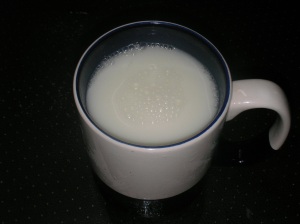Do you experience stomach discomfort (diarrhea, bloating, abdominal pains and flatulence) and are sometimes nauseous few hours after taking milk, other dairy products or any drink that contains lactose? Then you could be Lactose Intolerant. Lactose Intolerance refers to a condition where the lactose, a type of sugar mostly found in milk and other dairy products cannot be digested by the body.
Lactose Intolerance is caused by the body's inability to produce enough of the Enzyme Lactase to aid in the breakdown of lactose in the food consumed. Consequently, not all lactose in the food consumed is digested for absorption and hence passed on to the colon where bacteria (these are not harmful and is not in your colon as a result of infections) ferment it to produce fatty acids and a mixture of gases like hydrogen, methane and carbon dioxide to cause stomach discomfort.
The underlying reason why the body is unable to produce the Enzyme Lactase could be due to gastrointestinal diseases that disrupt the production of lactase, genetic defects that prevent the production of lactase, use of certain medication or overload of lactose intake.
It is advisable to visit your health centre for diagnosis but go with a record of what happens when you consume milk and other dairy products as well as what happens when you do not consume milk and other dairy products. This will help with diagnosis.
Lactose Intolerance can develop at any age but the risk of people of African, Asia, African-Caribbean descent is very high. It can be temporal or permanent and there is no cure for it. However, a person who has been diagnosed as Lactose Intolerant can use these tips to minimise the effects, stomach discomfort.
1. Avoid dairy products as well as products with lactose additives or consume in small quantities.
2. Choose dairy products which have less lactose content or lactofree by reading the food label.
 3.
Traditionally fermented dairy products such as cheese, sour milk and
yoghurt can serve as substitute for the use of non-fermented ones. The
lactose intolerant should however watch out when buying these fermented
dairy products as some of them (especially the modern processed) have a
good amount of lactose content.
3.
Traditionally fermented dairy products such as cheese, sour milk and
yoghurt can serve as substitute for the use of non-fermented ones. The
lactose intolerant should however watch out when buying these fermented
dairy products as some of them (especially the modern processed) have a
good amount of lactose content.4. Lactase substitute, a digestive aid could be prescribed to be taken with meals.
5. Consult a dietitian or nutritionist for further advice as removing or reducing milk and other diary products from diet could reduce Calcium and Vitamin D in your diet.
Get more tips from the book, Become A Healthier You.
About contributor
Irene Danquah, ANutr holds a BSc Biochemistry from the Kwame Nkrumah University of Science and Technology (KNUST), Ghana and an MSc Public Health Nutrition from the University of Southampton, UK. Irene is member of the UK Association for Nutrition (AfN) and the Ghana Nutrition Association. She is on the UK Voluntary Register of Nutritionists (UKVRN) as an Associate Nutritionist. Irene is the author of the book, Become A Healthier You. Like the World Bank, Irene also believes "Nutrition is an investment issue and improved nutrition is one of the major drivers of economic growth - World Bank, 2006".





 Posted in:
Posted in: 





1 comments:
Good information. Thanks!
Post a Comment